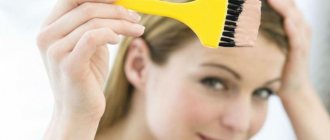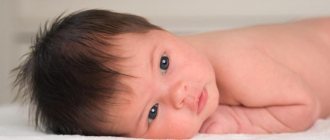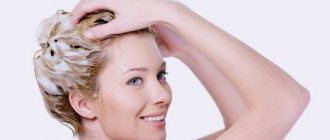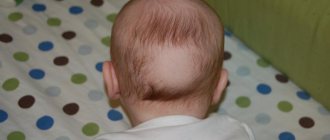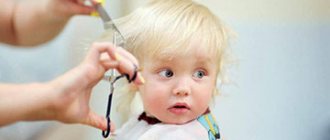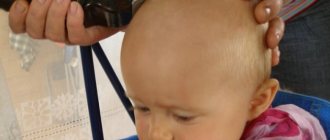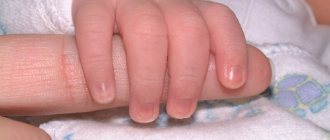Why shouldn't pregnant women cut their hair?
Due to the fact that a common sign prohibits pregnant girls from cutting their hair, many of them by the end of pregnancy have almost the same hairstyle - a modest ponytail gathered at the back of the head. We suggest you look into this issue and find out why you can’t adjust your haircut during pregnancy, according to beliefs and superstitions.
- From time immemorial, hair symbolized vital energy, and if a pregnant woman cut it off, she thereby deprived herself of the strength necessary for the favorable birth of a child. Childbirth promises to be especially difficult if a woman gets her hair cut in the last weeks.
- Superstitious people say that by cutting her hair during pregnancy, the expectant mother shortens the child's life. This belief is based on the fact that long hair is a symbol of longevity.
- Another sign states that such an act attracts trouble - the baby may be born lifeless.
- By cutting her hair during pregnancy, a girl risks making unfavorable changes to her own destiny.
- It has long been believed that cutting hair during pregnancy can provoke premature birth.
- One of the ancient signs after cutting hair promises the birth of a girl. This sign cannot be called bad, but at the same time it promised the cessation of procreation. And in ancient times, it was the boy who was the desired child.
- Long hair on an expectant mother is a sign that the child will be smart. And if a girl decided to cut them off, then this foreshadowed that the baby would live his life with a “short” mind, that is, he would be stupid.
But if a child was born with hair on his head, then according to superstition, this meant that he would have outstanding intellectual abilities, regardless of whether his mother cut his hair during pregnancy or not.
Signs and superstitions
Since ancient times, many myths and rumors have been associated with cutting hair during pregnancy. In those years, long locks were considered a sign of strength and protection, while short hair marked fatal changes in fate, grief and illness. Women are persistently advised not to shorten their hair under any circumstances while expecting a baby, because something bad will definitely happen to the expectant mother and child.
The most common signs and superstitions:
- With cut hair, strength goes away - according to this belief, women who cut their hair during pregnancy “cut off” part of their vitality and energy, which helps to bear a fetus and give birth safely. Many women still believe in this and try not to do anything with their hair in order to avoid miscarriage and difficult childbirth.
- By shortening your hair, you shorten the child's eyelid - this myth claims that hair is the custodian of energy not only for a woman, but also for the child she is carrying. Along with them, supposedly, the years of life that the child was entitled to, but were “cut off” by his mother, also go away.
- After a haircut, a stillborn child may be born - another superstition associated with the life forces of babies contained in the mother's hair. If you cut your hair just before giving birth, the child may lose strength and die in the womb or at birth.
Such terrible omens discouraged any expectant mothers from changing their image during pregnancy, but is everything so scary in the modern world?
Currently, the appearance and role of a woman have changed, and therefore the traditions associated with her have also changed. Hair is no longer given such a sacred meaning as before, and a change of image, even during pregnancy, is just the desire of the woman herself, unable to harm the health of the mother and child. On the contrary, if the expectant mother feels beautiful, well-groomed and elegant, the baby senses this and feels very comfortable. Moreover, pregnancy is accompanied by strong hormonal changes, which can also affect the condition of your hair. In this case, a haircut will be a salvation for your hairstyle.
Medical opinion
Doctors have nothing against women cutting their hair during pregnancy. Doctors say that there is no connection between this procedure and the development of the fetus in the womb, and therefore they have nothing against the expectant mother taking care of herself and looking good.
Doctors say that pregnant girls can have their hair cut. The only thing you need to pay attention to is hair care products: hair sprays, dyes, shampoos, conditioners, etc. Some of them can cause allergies.
In addition, the expectant mother may feel signs of toxicosis while using such drugs. For this reason, it is worth reconsidering the tubes on the shelf in the bathroom, abandoning products that contain too aggressive chemical compounds. And if there are signs of toxicosis due to the smells of a hairdresser, it is better to call a specialist to your home.
By cutting her hair during pregnancy, a girl risks making unfavorable changes to her own destiny.
What dye can you dye your hair during pregnancy?
An “interesting situation” is not a reason to refuse to change your image, only you need to approach the choice of drugs more thoughtfully. It is best, of course, to dye your hair with henna and basma. By combining these components in various proportions, you can get almost any color, from golden to deep black. Now on sale are ready-made mixtures containing basma, henna and other useful ingredients such as volcanic tuff.
In addition to bio-paints, which consist only of natural components, manufacturers also offer organic compositions that contain natural coloring pigments. Such products include not only the usual henna and basma. Essential oils, oak bark, and walnut powder are often added to such dyes. Containing glycerin, sorbitol, maltodextrin, citric acid, evenol, although they are chemical substances, one wouldn’t dare call them harmful. But they allow the paint to “set” faster, last longer, and effectively mask slight gray hair.
If you used permanent dye before becoming pregnant, replace it with a tinted shampoo of a suitable tone. It does not contain ammonia and peroxide, so it is absolutely safe, and is also convenient for independent use. A high-quality cosmetic product, thanks to its constituent herbal extracts, silk proteins, vitamins and oils, additionally cares for hair.
Alternative medicine opinion
Representatives of alternative medicine say that hair is a kind of conductor of energy flows. At conception, their cyclicity closes; Energy flows begin to circulate somewhat differently: in two circles. The outer circle allows the expectant mother to receive strength from the outside, the inner circle provides energy to the fetus.
Thus, it is better for pregnant women not to cut their hair, otherwise the supply of energy from the external environment will be interrupted. But this only applies to a radical change in hairstyle, when a significant part of the hair is cut off.
As for cutting the ends, this procedure is not only not prohibited, but is also encouraged: thanks to it, the flow of a new portion of energy will be constantly stimulated.
Experts in the field of alternative medicine give the following advice:
- The best time to cut your hair is on Thursday. This day of the week is the most suitable for freeing yourself from the negativity accumulated in your hair.
- After cutting, it is advisable to rinse your hair with salt. This substance absorbs negative energy, thereby strengthening health and improving well-being. You need to use salt as follows: before washing your hair, rub a small amount into the roots and rinse after a quarter of an hour.
- After the salt procedure, wrap your head in a green towel. This way you will establish protection from negativity and ensure an influx of healthy energy.
It is better for pregnant women not to cut their hair, otherwise the supply of energy from the external environment will be interrupted
What else should you consider before cutting your hair?
The number of superstitions associated with visiting a hairdresser is very large. Before cutting your hair, you should pay attention to the day of the week, your own physiological cycle and many other factors that at first glance are not related to your hairstyle:
- It is worth postponing going to the hairdresser during your period - this period is considered unfavorable for changing your image. After such a haircut, the hair may begin to fall out and split, dandruff will appear, and the styling will not hold its shape.
- Regarding the days of the week, there is only one clear limitation - Sunday. On this day you should not change anything in your appearance. In addition, in some books there is a mention of haircuts on Friday - on this day the biofield is very sensitive, so a radical change in appearance can radically change your life.
- Another restriction is to get your hair cut in the evening. Popular beliefs say: the later this ritual occurs, the more strength it takes.
- Inexplicable, but true: superstitions categorically prohibit relatives from cutting each other’s hair. This applies to wives and husbands, fathers and sons, mothers and daughters. For example, a mother can cut her son's hair, but she has no right to cut her daughter's hair - this can take away happiness and shorten her life.
- You should not cut your own hair - this can turn away your luck and cause illness.
Even a haircut in a dream has its own interpretation! Knowing what this or that event means in a dream, you can hear the advice of the subconscious and understand what the current circumstances are leading to. If you dreamed that your hair was being cut, expect financial losses and disappointment, and if you cut your hair, financial profit and success are ahead.
Scientists' opinion
During pregnancy, the growth of “dormant” hair follicles is activated, which improves the condition of the hair. This fact has been proven by scientists for a long time, and therefore they are perplexed when superstitious people tell why pregnant women should not cut their hair.
Their opinion is the opposite: if you don’t take care of your hair during this period, you run the risk of getting split ends and clumps of lost hair a few months after giving birth.
Scientists agree with doctors on this issue and deny the connection between hair cutting and the condition of the unborn child. As statistics show, there are known cases of miscarriages and the birth of children with pathologies in women with long hair. And at the same time, girls with short hair give birth to smart and healthy babies. In this matter, according to scientists, genetics plays a role.
When can you get your hair cut according to the lunar calendar?
The most popular advice on haircuts, coloring and even curling is given by astrologers based on the phases of the moon. The lunar calendar primarily warns against possible problems that may arise with hair. Choosing the wrong day to visit the hairdresser can cause increased hair loss, dandruff, dryness and other problems.
In addition, the phase of the moon affects the rate of hair growth. By choosing the right period, you can maintain your desired hairstyle for a long time or, conversely, grow long curls as quickly as possible. If you prefer to change your look often or dream of long curls, it is better to get your hair cut in the first or second quarter of the waxing Moon. If frequent visits to the hairdresser are not part of your plans, you should go for a haircut on the waning moon. A visit to the salon on a full moon is only suitable for those who have decided to radically change their image - change their color from light to dark colors and vice versa, get an extreme haircut, etc. In other cases, it is better to postpone beauty restoration. And during an eclipse and a new moon, it is not recommended for anyone to visit a master - it is believed that this can shorten a person’s life.
There are only 3 new moons left in 2021:
- October 19,
- November 18th,
- December 18.
Following the new moon, the waxing moon phases begin, which last a total of about two weeks. And after the full moon, the Moon gradually wanes, turning into the old state. Using this calendar as a guide, you can figure out what period is best to get your hair cut in order to achieve ideal hair condition.
Psychologists' opinion
During pregnancy, hormonal levels undergo serious changes, which is why a woman is able to take signs, as they say, very to heart. For this reason, any statement and opinion from the outside is perceived too emotionally.
And if the expectant mother constantly hears that she cannot cut her hair before giving birth, over time she will begin to strongly doubt whether she can go to the hairdresser and change her hairstyle.
The result in this case may not be the most favorable, and what is most remarkable is that it may seem that the omen really works. The girl will convince herself that the haircut will have a detrimental effect on the health of her child, and what she fears most will happen.
However, if a person has high emotional stability and is able to maintain clarity of mind and prudence in any situation, such statements will not touch him. In this case, the woman will not allow superstitions to influence the course of events in any way.
As a result, she will cut her hair and look attractive, which will certainly have a positive effect on her mood, and in this case, nothing can harm the baby’s health.
Psychologists agree on one opinion: the cutting process itself is in no way capable of affecting the intrauterine development of the fetus. The main factor is the emotional state of the girl who is expecting the birth of a baby.
Psychologists agree: the process of cutting itself is in no way capable of affecting the intrauterine development of the fetus.
When cutting hair can really harm a woman
However, in some cases, even doctors advise against going to the hairdresser and cutting your hair.
It is recommended to postpone the procedure until after the baby is born if:
- The expectant mother is not feeling well - high blood pressure, weakness, toxicosis, swelling. In this case, going to the hairdresser will only make you feel worse.
- The girl is very superstitious. If such a woman violates the ban for the sake of an attractive appearance, she will be tormented by doubts and anxiety for the fate of the baby. Negative emotions also affect the baby’s well-being, so you should refuse a cosmetic procedure.
- Father and mother or husband's parents are against violating ancient rules. A pregnant woman should make concessions to them and not spoil the relationship before the baby is born.
Church opinion
The Orthodox Church considers any superstition a sin. The clergy insist that pregnant women should not pay attention to various signs. It is better to beware of such conversations in order to maintain a positive attitude and faith that the child will be born absolutely healthy.
The Church has always urged its visitors to maintain sobriety and not lose common sense. Having a haircut during pregnancy cannot be punishable, since God does not pay attention to the appearance of a pregnant girl. It is important for him that her soul is pure and faith lives in her.
In the old days, cutting hair was not considered a sinful act, even though a long braid was the pride of any girl.
Historical analysis of signs about hair
We need to start with an absolute fact - hair protects our body from frostbite and retains heat . Our ancestors understood this, and they also greatly valued warmth. Therefore, voluntary refusal of it, especially by the expectant mother, was perceived negatively and was regarded as carelessness towards the fetus. In many ways, this determined the nature of the signs that appeared on this topic.
An important point is that hair is a kind of reservoir of human energy, a repository of his strength and wisdom. With just one hair, an evil sorcerer could destroy a person, influence his health and even control him.
What can we say about the expectant mother and the child she is carrying, because he completely depends on her well-being. Therefore, it was not recommended to leave your hair anywhere, as enemies could take advantage of this to provoke a miscarriage.
Among the Slavs, it was considered dangerous when a person combs his hair into the wind - this could lead to death. Caring for them was allowed only on certain days of the week, the determination of which was associated with the lunar phase.
Expectant mothers were strictly forbidden to touch their hair on Fridays; this could offend the Most Holy Paraseva Friday, who was considered the benefactor of women in labor. The cut hair was buried or burned, the main thing was that it did not fall into the wrong hands.
Often a man chose his wife based on the length of her braid. Hair cut spontaneously was a disgrace, an indication of debauchery and lack of will.
It was in such ideas that the modern idea of this sign was formed.
We list its main interpretations:
- Cutting hair leads to the fact that the child will be born stupid, “narrow-minded,” “short in mind.”
- If you cut your braid during pregnancy, you will cut off years of your baby’s life, that is, he will live less than he should.
- Hair is a conductor of energy; if it is cut, the fetus in the womb will wither and die.
As it turns out, modern superstitions in this regard are no different from those that existed before. Let's find out what science thinks about this.
Opinion of a modern mother
A pregnant woman should feel happy. And for this you need to satisfy your own desires. And here it doesn’t matter what exactly you want: comfortable and beautiful clothes, a delicious cake or a new hairstyle.
Modern mothers prefer not to pay attention to omens and other similar “horror stories”. They consider all this to be prejudice. It is better to think about yourself and your own well-being.
Moreover, by updating her haircut, the girl will feel more confident in herself, therefore, she will bring positive emotions into everyday life, which will definitely have a good effect on the development of the fetus.
Modern mothers prefer not to pay attention to omens and other similar “horror stories”
Hair care during pregnancy
The recommendations can be reduced to several general provisions:
- Hair needs constant care. Let it be minimal - it is enough to trim the ends once every 1-3 months. Otherwise, they may begin to split, making them look untidy.
- When choosing care products, give preference to those that contain a minimum amount of chemicals. The regime should be as gentle as possible. And here we are not talking about the fact that you cannot change the color. Just tell your specialist that you are expecting a baby, and he will select the most suitable product for you.
- To prevent hormonal changes from affecting the condition of your hair, try to apply a nourishing mask to the roots once a week.
- Try to avoid styling products that contain alcohol.
Do not take signs about haircuts during pregnancy to heart. After all, during this important period, mood and well-being should come first. If superstitions haunt you, trim only the ends - this will definitely not happen.
How can an expectant mother take care of her hair?
Typically, pregnancy has a beneficial effect on hair, but maintaining healthy curls is necessary. In addition, proper care will help preserve your hair after childbirth, when your hair becomes tight.
First of all, do not tie your hair with elastic bands or braid it into tight braids. It is better for the curls to lie freely, then prevent damage. Do not walk bareheaded in the bright sun or in the cold - unfavorable external influences will damage your hair.
Wash your hair correctly
If your hair is dirty, wash it; look clean - don't rush to the bathroom. Frequent washing dries out curls.
Turn on warm water. Hot will dry out the ends, cold will provoke a spasm of skin vessels, which will lead to hair loss.
Rinses will strengthen hair and make it more manageable; but when applying the product, remember that it should not get on the scalp. There will be no harm to the strands from the synthetic substances in the conditioner: hair shafts consist of dead tissue.
Natural rinses are also suitable - whey, homemade decoctions of St. John's wort, chamomile.
A decoction is prepared from chamomile flowers to rinse hair.
How to dry your hair safely:
- using a towel, and avoid rubbing;
- if you prefer a hairdryer, turn off the hot mode and turn it on cold - otherwise you will damage your hair;
- Do not use hot tongs or straighteners for styling.
To give the hairstyle a shape, use varnishes and foams; study the composition of the product - many contain alcohol and are not suitable for expectant mothers. Also avoid gels and mousses that emit intrusive aromas.
We provide nourishing masks and massages
Hair masks made from natural ingredients will give your locks a healthy, well-groomed look and get rid of split ends. Masks are prepared from:
- rye bread;
- egg yolks;
- sour cream or kefir;
- honey.
Photo gallery: products used to make nourishing hair masks
Cottage cheese contains a lot of vitamin B12, as well as calcium; It's best to eat at night
If you want to dye your hair
Any hair dye contains chemical components.
Moreover, there is an assumption that toxic solutions penetrate under the scalp, into the network of blood vessels, and are carried by the blood throughout the body, passing through the placenta to the fetus. There is no experimental evidence to support this hypothesis, but the potential danger is alarming. But a possible allergy of a pregnant woman to chemicals from hair dye is a well-proven fact. A negative reaction of the mother’s body will also lead to threats to the intrauterine development of the fetus.
Finally, many paints contain ammonia, a toxic substance whose vapors are undesirable for either the expectant mother or the child to inhale.
So the safest option for a pregnant woman is to hold off on dyeing her hair. And if you can’t bear it or have a good reason to change the color of your curls, follow the recommendations:
- do not dye your hair in the 1st trimester;
- choose ammonia-free paint;
- try to dye your hair using natural products - henna, basma; True, they will not “fall” on hair that has previously been dyed with a chemical composition;
- use techniques in which the hair roots are not dyed (then the dye will not get on the scalp).
Be prepared for the fact that the new hair color will greatly surprise you: in pregnant women, under the influence of hormones, the structure of the curls changes greatly and the coloring will give a different result from the previous one.
Perm is contraindicated for pregnant women at all stages.
A few more tips
Wanting to look neat, the expectant mother wonders how to safely remove hair under the arms or in the bikini area. The main principle: the procedure should not cause pain, especially in the early stages, otherwise the tone of the uterus will increase and the threat of miscarriage will increase.
The method of removing hair along with the bulb is called epilation. Pregnant women are prohibited:
- electrolysis - getting rid of hair using electric current; the procedure is painful, and the current threatens to negatively affect the fetus;
- laser hair removal - removes hair using rays of a certain wavelength; the effect of laser on the unborn child has not been studied;
- photoepilation - frees the skin from hair in a similar way and, just like laser, has been little studied.
Hair removal using wax strips is not contraindicated for expectant mothers, however, this method is too inconvenient for removing hair in the bikini area. Chemical depilation using creams can cause an allergic reaction.
The old faithful razor remains - choose one that is designed for women, safe, with a floating head; Doctors have no objections to razors.
If the expectant mother cuts hair for her relatives and friends - this is a hobby - or works as a professional hairdresser, during pregnancy she needs to weigh the pros and cons. Consider the inevitable hormonal imbalance that accompanies pregnancy, mood swings; This does not have the best effect on the quality of hairstyles. If you work in a beauty salon, the abundance of “chemicals” around poses a threat to the health of the unborn baby, so consult a doctor about whether it is worth continuing to work.
